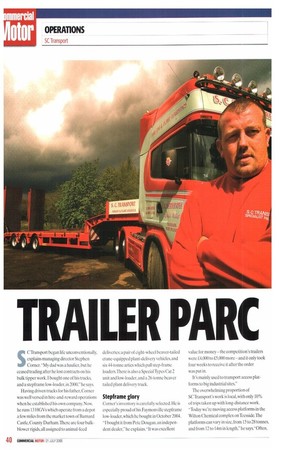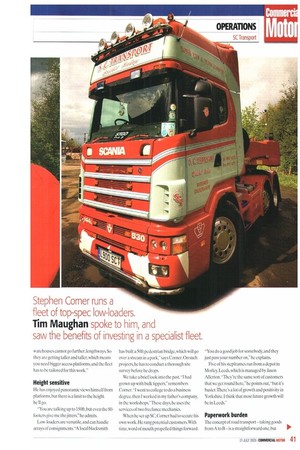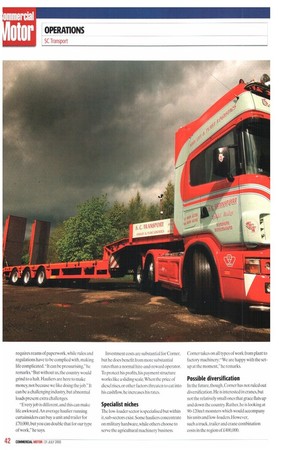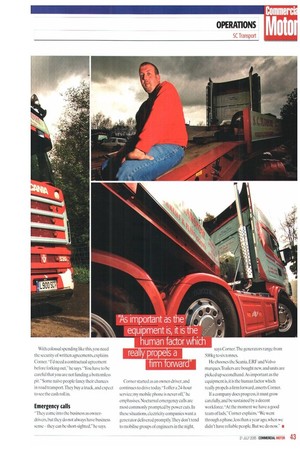IRA LER PARC
Page 40

Page 41

Page 42

Page 43

If you've noticed an error in this article please click here to report it so we can fix it.
SCTransport began life unconventionally, explains managing director Stephen Corner. My dad was a haulier, but he ceased trading after he lost contracts on his bulk tipper work. I bought one of his trucks, and a stepframe low-loader, in 2000," he says.
Having driven trucks for his father, Corner was well versed in hire-and-reward operations when he established his own company. Now, he runs 13 HCiVs which operate from a depot a few miles from the market town of Barnard Castle, County Durham.There are four bulkblower rigids, all assigned to animal-feed deliveries; a pair of eight-wheel beaver-tailed crane-equipped plant-delivery vehicles, and six 44-tonne artics which pull step-frame loaders. There is also a Special Types Cat 2 unit and low-loader, and a 26-tonne beaver tailed plant delivery truck.
Stepframe glary
Corner's inventory is carefully selected. He is especially proud of his Faymonville stepframe low-loader, which he bought in October 2004. "I bought it from Pete Dougan, an independent dealer," he explains "It was excellent value for money— the competition's trailers were £4,000 to £5,000 more— and it only took four weeks to receive it after the order was put in.
It's mainly used to transport access platforms to big industrial sites" The overwhelming proportion of SC Transport's work is local, with only 10% of trips taken up with long-distance work. "Today we're moving access platforms in the Wilton Chemical complex on Teesside.The platforms can vary in size, from 15 to 28 tonnes, and from 12 to 14m in length," he says. "Often, warehouses cannot go further, lengthways. So they are getting taller and taller, which means you need bigger access platforms, and the fleet has to be tailored for this work.
Height sensitive
He has enjoyed panoramic views himself from platforms, but there is a limit to the height he'll go.
"You arc talking up to 150ft, but even the 80footers give me the jitters," he admits.
Low-loaders are versatile, and can handle arrays of consignments. "A local blacksmith has built a 50ft pedestrian bridge, which will go over a stream in a park," says Corner. On such projects, he has to conduct a thorough site survey before he drops.
We take a brief look into the past.'l had grown up with bulk tippers," remembers Corner." I went to college to do a business degree, then I worked in my father's company, in the workshops."These days, he uses the services of two freelance mechanics.
When he set up SC, Corner had to secure his own work. He rang potential customers. With time, word of mouth propelled things forward. "You do a good job for somebody, and they just pass your number on," he explains.
Five of his stepframes run from a depot in Morley, Leeds, which is managed by Jason Allerton."They're the same sort of customers that we get round here," he points out," but it's busier.There's a lot of growth and positivity in Yorkshire. I think that most future growth will be in Leeds."
Paperwork burden
The concept of road transport — taking goods from A to B —is a straightforward one, but requires reams of paperwork, while rules and regulations have to be complied with, making life complicated."It can be pressurising," he remarks. "But without us, the country would grind to a halt. Hauliers are here to make money, not because we like doing the job." It can be a challenging industry, but abnormal loads present extra challenges.
"Every job is different, and this can make life awkward. An average haulier running curtainsiders can buy a unit and trailer for £70,000, but you can double that for our type of work," he says. Investment costs are substantial for Corner, but he does benefit from more substantial rates than a normal hire-and-reward operator. To protect his profits, his payment structure works like a sliding scale. When the price of diesel rises, or other factors threaten to eat into his eashflow; he increases his rates.
Specialist niches The low-loader sector is specialised but within it, sub-sectors exist. Some hauliers concentrate on military hardware, while others choose to serve the agricultural machinery business. Corner takes on all types of work from plant to factory machinery:"We are happy with the setup at the moment," he remarks.
Possible diversification In the future, though, Corner has not ruled out diversification. He is interested in cranes, but not the relatively small ones that grace fiats up and down the country. Rather, he is looking at 90-120m/t monsters which would accompany his units and low-loaders. However, such a truck, trailer and crane combination costs in the region of £400,000. With colossal spending like this, you need the security of written agreements, explains Corner. "I'd need a contractual agreement before forking out," he says. "You have to he careful that you are not funding a bottomless pit." Some naive people fancy their chances in road transport. They buy a truck, and expect to see the cash roll in.
Emergency calls
-They come into the business as ownerdrivers, but they do not always have business sense — they can he short-sighted," he says. Corner started as an owner-driver, and continues to drive today."I offer a 24-hour service; my mobile phone is never off," he emphasises. Nocturnal emergency calls are most commonly prompted by power cuts. In these situations, electricity companies want a generator delivered promptly. They don't tend to mobilise groups of engineers in the night, says Cornen'The generators range from 500kg to six tonnes.
He chooses the Scania,ERF and Volvo marques.Trailers are bought new, and units are picked up secondhand.As important as the equipment is, it is the human factor which really propels a firm forward, asserts Corner.
If a company does progress, it must grow carefully, and be sustained by a decent workforce. 'At the moment we have a good team of lads," Corner explains."We went through a phase, less than a year ago, when we didn't have reliable people. But we do now." •


































































































































































































